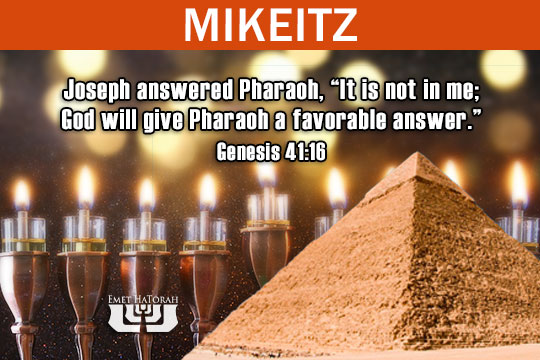Parashat Mikeitz - Genesis 41:1-44:17
Series:

Nearly every year Parashat Mikeitz is read in conjunction with the celebration of Hanukkah. Is there any parallel or insight we can find in this week’s Torah portion that relates to Hanukkah? A few of our rabbis (particularly Rabbi Yaakov Weinberg) have brought insight into this correlation. Our parashah tells us:
And Pharaoh said to Joseph, “I have had a dream, and there is no one who can interpret it. I have heard it said of you that when you hear a dream you can interpret it.” Joseph answered Pharaoh, “It is not in me; God will give Pharaoh a favorable answer.” (Genesis 41:15–16)
In this instance we read of Joseph being brought before Pharaoh to interpret his dream. Pharaoh begins his conversation with Joseph by giving him credit for being able to interpret dreams. Rather than taking credit himself, Joseph deflects this statement and gives proper recognition to God as the true interpreter of dreams. Joseph is an example of true example of humility. In him we see a firm reliance upon God. He realizes that everything that happens to him—every success and every failure—is in the hands of Heaven. He is only the vessel through which the Creator can do His will. He shined his light before Pharaoh. A single candle amidst the darkness of Egypt.
We see this in the leadership of Judah Maccabee as well:
And Judah and his brethren saw that evils were multiplied, and that the armies approached to their borders, and they knew the orders the king had given to destroy the people and utterly abolish them. And they said every man to his neighbor, “Let us raise up the low condition of our people, and let us fight for our people, and our sanctuary.” And the assembly was gathered that they might be ready for battle, and that they might pray, and ask mercy and compassion. (1 Maccabees 3:42–44)
As he led his small band of freedom fighters in guerrilla warfare tactics against the Greek armies he knew that their success was entirely in the hands of Heaven. The Greeks out numbered them and out powered them, but they knew that victory was not entirely dependent upon themselves. Yes, they would have to do their part, but God was the ultimate determination in the outcome. They chose, therefore, to put their trust in Him:
It is an easy matter for many to be shut up in the hands of a few, and there is no difference in the sight of the God of heaven to deliver with a great multitude, or with a small company. For the success of war is not in the multitude of the army, but strength comes from heaven. They come against us with an insolent multitude, and with pride, to destroy us and our wives and our children, and to take our spoils. But we will fight for our lives and our laws, and the Lord himself will overthrow them before our face, but as for you, fear them not. (1 Maccabees 3:18–22)
The result was that their small and tattered armies were able to bring victory to their people against a great foe. The Maccabees could have commemorated their victory over the mighty Greek armies through a traditional victory march year after year. They could have had a monument built in their name. They could have done a number of things that would have been self-focused and for their own glory. But they chose to do something that would put bring honor to the One who had given them the victory. They chose to have an eight-day celebration of the miracles that God performed for them. They chose to bring light into the world through a yearly reminder of the rededication of God’s Holy House. We call that reminder Hanukkah.
When we light the Hanukkah lights this week, let us remember all of the miracles that our God has done for us. Joseph continually remembered and gave glory to the One whom it was due. So did the Maccabees. Let us do the same and thereby shine some light into this dark world around us.








